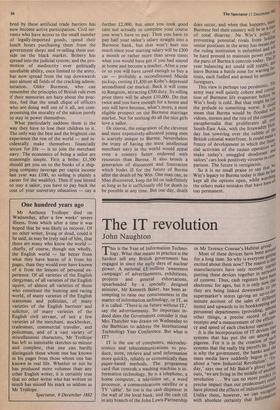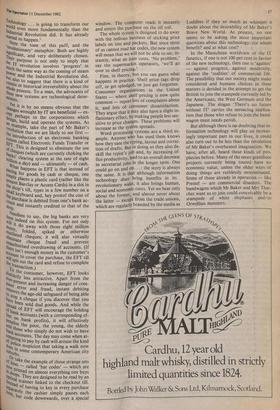The IT revolution
John Naughton
TPhis is the Year of Information Techno- logy. What that means in practice is the hardest sell any British government has engaged in since the early days of nuclear power. A national £3 million 'awareness campaign' of advertisements, exhibitions, projects and general exhortations, spearheaded by a specially designed minister, Mr Kenneth Baker, has been at- tempting to raise our consciousness in the matter of information technology, or IT, as it is called. 'There is no future without IT,' say the advertisements. So important in- deed does the Government consider it that Mrs Thatcher was drawn on Wednesday to the Barbican to address the International Technology Year Conference. But what is IT?
IT is the use of computers, microelec- tronics and telecommunications to pro- duce, store, retrieve and send information more quickly, reliably or economically than paper-based methods. The programme card that controls a washing machine is in- formation technology. So is a telephone, a home computer, a television set, a word processor, a communications satellite or a TV 'cable'. So too is the cash dispenser in the wall of the local bank, and the cash till in any branch of the John Lewis Partnership
or Mr Terence Conran's Habitat grouP. d Most of these devices have been at°11.firig fora long time. So why is everyone gettui—i excited about them now? The reason is wend manufacturers have only recently or putting these devices together in netviko;en of systems. Thus, cash registers have that electronic for ages, but it is only now the they are being linked downwards to 'he, supermarket's stores (giving an uP-f111 minute account of the sales of di i fie,-/id items) and upwards to its bookkeePing 7,0g personnel departments (providing, artiLes other things, a precise record of, Terv receipts and a measurement of the ebic- cy and speed of each checkout It is the incorporation of IT devices Inv systems that has put the cat among to pigeons. For it is in the creation of That systems that the really big payoffs is why the government, the banks mass media have suddenly begun to about a 'new Industrial Revolution'. d, day,' says one of Mr Baker's glossy hand outs, 'we are living in the middle of arl.ot“.ts revolution ... We can no more p _redict precise impact than our predecessors 09,t10. have plotted the effects of industrialisati°ise oPerato.r)io Unlike them, however, we can recogn,00 with absolute certainty that Infoati Technology is going to transform our World even more fundamentally than the Industrial Revolution did. It has already started to happen.' , Note the tone of this puff, and the revolution,, metaphor. Both are highly silgoificant, and very deliberately chosen. heir Purpose is not only to imply that the IT revolution involves 'progress' in In,such the same way as the coming of steam cower and the Industrial Revolution did, Ut also to suggest that there is a kind of osinic or historical irreversibility about the wthhnie process. To a man, the advocates of „ese new systems are technological deter- "aims, ci,,Yet it is by no means obvious that the cstges wrought by IT are beneficial — ex- V)! Perhaps to the corporations which „engo, build and operate the systems. As U example, take the part of Mr Baker' s tevolution that we are likely to see first— „he Introduction of an electronic banking 41Lteni called Electronic Funds Transfer or 4'1. This is designed to eliminate the use b cheques (which are currently choking the ks' clearing system at the rate of eight ,1,M a day) and — ultimately — of cash. 7hat happens in EFT is that instead of for goods by cash or cheque, one ni,.."Y Places a plastic card (rather like the t'h'esent Barclay or Access Cards) in a slot in s e sihoP's till, types in a few number on a tinilad keyboard and, hey presto! the cost of coe Purchase is debited from one's bank ac- Inn and instantly credited to that of the shop.
k Needless to say, the big banks are very we.e, o.1ndeed on this system. For not only TrIni it do away with those eight million tn!ss.Y, folded, spiked or otherwise etl.lated cheques; it will also virtually „Ilninate cheque fraud and prevent tliriauthorised overdrawing of accounts. (If ar,enre Isn't enough money in the customer' s winnot to cover the purchase, the EFT till if; sPit out the card and refuse to complete ertransaction.) dist53 the consumer, however, EFT looks ev-inctlY. less attractive. Apart from the Duer-Present and increasing danger of corn- reter error and fraud, instant debiting tent°ves the age-old safeguard of being able h st°P a cheque if you discover that you sp4ve been sold dud goods. And while the of7,ad of EFT will encourage the holding fe cyank accounts (with a corresponding ef- Deht ,911 bank profits), it will effectively ati-ciatise the poor, the young, the elderly ba;,th°se who simply do not wish to have te a.ecounts. The day may come whenat- opPu6 nn to Pay by cash will arouse the kind dee"!lee suspicion that taking a walk now silks In sortie contemporary American city 0 f .1. take the example of those strange sets lines — called 'bar codes' — which are iii;• Printed on almost everything one buys opthi °Ps. They are designed to be read by an Ins:Cal scanner linked to the checkout till. se14`eki of having to key in every purchase iteraratelY the cashier simply passes each nt, bar code downwards, over a special
window. The computer reads it instantly and enters the purchase on the till roll.
The whole system is designed to do away with the tedious business of sticking price labels on tins and packets. But since most of us cannot read bar codes, the new system will mean that we will not be able to see, in- stantly, what an item costs. 'No problem,' say the supermarket operators, 'we'll go over to shelf pricing.' Fine, in theory, but you can guess what happens in practice. Shelf price tags drop off, or get splodged, or just get forgotten. Consumer organisations in the United States — where shelf pricing is now quite common — report lots of complaints about it, and lots of consumer dissatisfaction. They argue that it may also have a slight in- flationary effect, by making people less sen- sitive to price changes. These problems will increase as the system spreads. Word processing systems are a third ex- ample. Anyone who has used them knows how they ease the typing, layout and correc- tion of drafts. But in doing so they also de- skill the typist's job and, by increasing of- fice productivity, lead to an overall decrease in secretarial jobs in the longer term. One could go on and on... : the story is always the same. It is that although information technology does bring benefits in its revolutionary wake, it also brings human, social and economic costs. Yet we hear only about the former, and almost never about the latter — except from the trade unions, which are regularly branded by the media as Luddites if they so much as whimper a doubt about the desirability of Mr Baker's Brave New World. At present, no one seems to be asking the most important questions about this technology: for whose benefit? and at what cost?
In the Manichean worldview of the IT fanatics, if one is not 100 per cent in favour of the new technology, then one is 'against' — against progress, against modernity, against the 'realities' of commercial life. The possibility that our society might make considered and humane choices in these matters is derided in the attempt to get the British to join the stampede currently led by the Americans, the West Germans and the Japanese. The slogan 'There's no future without IT' carries the menacing implica- tion that those who refuse to join the band- wagon must needs perish.
But although there is no doubting that in- formation technology will play an increas- ingly important part in our lives, it could also turn out to be less than the revolution of Mr Baker's overheated imagination. We have, after all, heard these kinds of pro- phecies before. Many of the more grandiose projects currently being touted have no economic value, unless the older ways of doing things are ruthlessly exterminated. Some of those already in operation — like Prestel — are commercial disasters. The bandwagon which Mr Baker and Mrs That- cher want us to join could conceivably be a stampede of white elephants and/or Orwellian monsters.











































 Previous page
Previous page